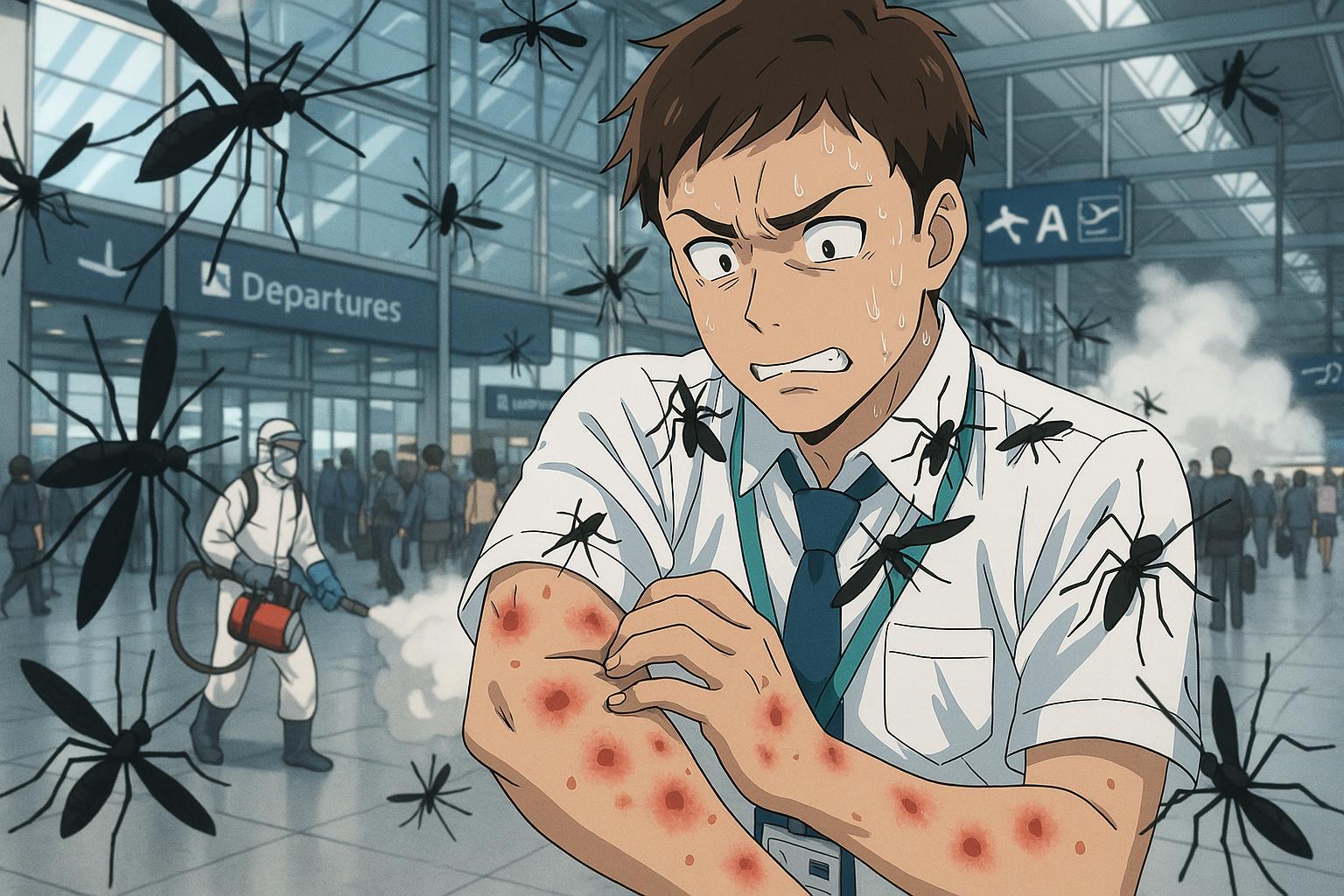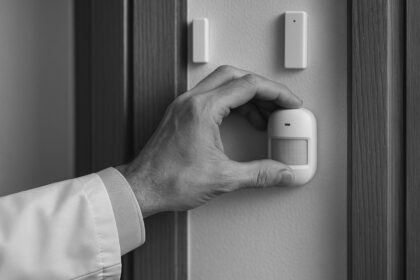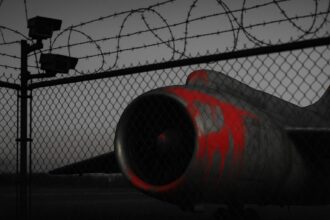Amid reports of biting insects and staff health worries, Madrid’s Adolfo Suárez Barajas Airport faces mounting tensions over pest management and the growing homeless population sheltering in Terminal 4, prompting official denials and calls for greater transparency.
Concerns have erupted at Madrid’s Adolfo Suárez Madrid-Barajas Airport over reports of insect bites, leading to a chaotic response involving pest control interventions. Workers have raised alarms about “biting insects,” prompting management to call in pest specialists. Numerous staff members have claimed to be bitten during their shifts, with photographic evidence highlighting the issue. Despite these accounts, Aena, the airport’s operator, has categorically denied any confirmed cases of bedbug infestations, asserting that while insects have been detected in “very limited” zones, rigorous inspections and pest control measures have not uncovered a widespread outbreak.
In a statement intended to clarify the situation, Aena confirmed the activation of pest control services following staff reports but maintained that no infestation had been confirmed. The company also revealed that they have continually monitored specific areas and collaborated with cleaning and pest management teams to enact targeted pest treatments. The airport’s management stressed that conditions remain under control, particularly within Terminal 4, which has been at the centre of these claims.
However, the atmosphere among workers remains fraught. Reports indicate that concerns extend beyond insect sightings, as some employees are experiencing respiratory issues linked to recent pesticide applications. These claims have drawn the attention of the ASAE union, which has escalated the matter to the Madrid City Council and subsequently to Spain’s Ministry of Health for further examination. The lack of transparency from Aena has left many airport staff unsettled about their working conditions, leading to calls for more comprehensive inspections and measures to ensure their safety.
Underlying these health concerns are larger issues, particularly the presence of a significant homeless population utilizing the airport as a refuge. A recent study by Caritas has revealed that around 421 homeless individuals are currently seeking shelter in Terminal 4. These figures have surged in the wake of city-funded initiatives that provided support over winter. Critics have accused Aena of implementing measures designed to dissuade homeless individuals from seeking refuge in the terminal, including restricting access, altering air conditioning to make conditions uncomfortable, and removing benches from waiting areas. Gaspar García, a coordinator with the charity Bokatas, voiced concern that these actions have exacerbated tensions and further marginalised vulnerable individuals.
This struggle at Madrid Airport parallels a broader national trend. Experts attribute a notable increase in bedbug cases across Spain to factors including climate change, which has created warmer conditions conducive to the rapid reproduction of these pests. Reports show an alarming 71% escalation in cases this year compared to the previous year’s figures. Health professionals recommend preventive measures such as washing bedding at high temperatures to counteract these infestations, especially as travellers become increasingly mobile and interconnected through public transport and shared facilities.
While Aena has consistently insisted that the operational integrity of the airport remains intact, the developments surrounding pest control and homelessness spark essential conversations about infrastructure and public health. These situations underscore the importance of proactive and humane responses to urban homelessness, alongside rigorous sanitation practices.
As the response unfolds, the intertwined issues of public health and social responsibility at major transportation hubs like Madrid Airport reveal the complexities faced by metropolitan regions in addressing both pest control and social welfare with agility and clarity.
Reference Map
- Paragraph 1: [1], [4]
- Paragraph 2: [1], [5]
- Paragraph 3: [2], [4]
- Paragraph 4: [2], [6]
- Paragraph 5: [3]
- Paragraph 6: [3], [6]
- Paragraph 7: [1], [4]
Source: Noah Wire Services
- https://www.liverpoolecho.co.uk/travel/madrid-airport-bedbug-infestation-denied-31659071 – Please view link – unable to able to access data
- https://inspain.news/bed-bug-reports-at-madrid-barajas-spark-health-concerns-among-airport-staff/ – Reports of bed bug sightings and bites at Madrid-Barajas Airport have sparked growing concern among employees, despite official denials from AENA, the airport’s operator. Staff have shared photos and messages highlighting ongoing problems, including visible bed bugs and bite marks, particularly in check-in areas. Alongside bite reports, staff have raised alarms about the side effects of disinfection treatments, with some employees experiencing coughing and breathing difficulties since pesticide use began. Employees have also criticized how the situation is being handled, citing a lack of clarity and transparency from AENA. Despite reassurances from airport management, staff remain deeply concerned about their safety and working conditions. The ASAE union has escalated the issue, formally reporting it to Madrid City Council, which has passed the matter to Spain’s Ministry of Health for further investigation. AENA has yet to confirm whether additional inspections will take place or whether alternative methods will be used to mitigate health impacts for staff. The situation continues to develop, with further updates from health authorities and the airport operator expected.
- https://inews.co.uk/news/world/bedbug-cases-soar-spain-madrid-valencia-balearics-spike-blamed-heat-2705464 – Experts have warned of a rise in bedbugs across Spain, including Madrid, Valencia, and the Balearic Islands, attributing the spike to warmer weather caused by climate change. The number of recorded cases has risen by 71% this year compared to the first nine months of last year, according to a report by Anticimex, a company specializing in pest removal. Luis Quevedo, a scientific expert in dealing with these insects, noted that heat appears to be one of the factors behind the rise, as bedbugs are reproducing faster in the context of climate change and heatwaves. He mentioned that the insects’ reproduction cycle has been reduced from about a month to two weeks. Cases have also been reported on the Camino de Santiago pilgrimage route, where the insects were spread in travelers’ backpacks and public transport. The Spanish Institute of Insect Science for Family Health advised washing bedding and clothing at high temperatures to prevent bedbug infestations.
- https://ftnnews.com/travel-news/news-from-spain/madrid-airport-faces-bug-scare-you-wont-believe-what-triggered-the-latest-health-alert/ – Madrid Airport is under scrutiny after reports of insect bites at Terminal 4 raised health concerns among workers and triggered a multi-agency response. Although no infestation has been confirmed, the situation has drawn attention to the airport’s pest control procedures, cleanliness protocols, and the presence of hundreds of unhoused individuals within the terminal complex. The issue began when the Aena/Enaire Trade Union Alternative (Asae) filed a complaint with the Community of Madrid about an alleged insect infestation at Adolfo Suárez-Madrid Barajas Airport’s Terminal 4. The complaint was passed through various levels of local government, from Madrid Salud to the Foreign Health Department. Alongside the formal report, the union distributed photographs showing counters being fumigated and workers with visible bite marks. Despite the alarming visuals, Spanish Airports and Air Navigation (Aena)—the operator of Madrid Airport—stated that the pest control company contracted to manage infestations found no evidence of a widespread outbreak. Still, precautionary measures were put in place, including focused inspections, monitoring, and localized pest treatment where any insects were discovered. Aena emphasized that pest control services are carried out even in the absence of confirmed infestations if complaints arise. In the most recent reports of bites, the pest control company did not determine the presence of an infestation but still performed thorough evaluations and interventions in defined areas. While Aena insists the situation is under control, the union behind the alert raised broader concerns. Asae linked the potential pest problem to the estimated 300 to 500 homeless individuals living in various areas of Barajas Airport, including Terminal 4. The union is now advocating for the evacuation of this population to prevent “health problems” among airport personnel and travelers. This raises sensitive questions about the use of public infrastructure as de facto shelters and the impact it may have on operations and hygiene. Although Madrid Airport is not alone in facing this issue—many major international hubs grapple with housing insecurity within their premises—the public nature of this dispute has pushed the topic into the spotlight. Based on available evidence, there is no reason to avoid flying through Madrid Airport. Aena’s response indicates that airport operations remain unaffected and that preventative cleaning measures continue. No passenger reports of insect bites or infestations have been confirmed, and flights are operating on schedule. However, the episode has raised legitimate questions about airport sanitation practices, the responsibilities of operators in addressing vulnerable populations, and how quickly issues can escalate in the public eye—even without scientific confirmation.
- https://www.newsminimalist.com/articles/spains-airport-operator-denies-madrid-airport-bedbug-infestation-f9c80a3e – Spain’s airport operator, Aena, denies claims of a bed bug infestation at Madrid’s main airport, Adolfo Suárez Madrid–Barajas Airport (MAD). The company issued a statement following reports of insect bites among airport workers. Aena acknowledged detecting insects in ‘very limited’ areas but said pest control did not confirm an infestation. The operator stated that inspections and treatments are ongoing and that they are working with cleaning and specialized firms. The statement comes amid rising tensions with Madrid City Council over homeless individuals at the airport, with Aena urging the city and regional government to find a solution for social protection.
- https://e.vnexpress.net/news/world/madrid-airport-overwhelmed-by-asylum-seekers-4708399.html – The overcrowding and unsanitary conditions at Madrid Airport have reached critical levels, causing outbreaks of bedbugs, a build-up of garbage, and a shortage of towels for personal hygiene. Videos sent to media by airport police officers show cockroaches on the floor and unsanitary showers. More asylum claims were made at the airport in January—864—than during all of 2022, the last year for which official figures are available, when 767 were filed. The number of migrants held at Madrid airport at the end of January stood at between 390 and 450, according to CEAR and police union SUP, up from 250 at the end of December. Overwhelmed authorities were unable to stop 17 people from escaping the holding areas by breaking windows. Another six people tried unsuccessfully to flee by crawling through a false ceiling. After raising concerns about the situation, the Red Cross took the unusual step last week of stopping providing services to asylum seekers at the airport.
- https://www.infomigrants.net/en/post/54874/hundreds-of-asylum-seekers-stranded-at-madrid-airport – The problem at Barajas Airport has been worsening since the middle of last year, when the number of people requesting international protection at the airport started to rise. By December, according to CEAR spokesperson Elena Muñoz, some people were having to share mattresses on the floor among bed bugs and cockroaches. The number of people stuck at the airport under these conditions had reached 400 last week. A Spanish interior ministry spokesperson told Reuters that the number of migrants ‘fluctuates’ with flight arrivals and would not estimate how many people are currently staying at the airport. There are three rooms equipped with bathrooms set aside for migrants seeking asylum, with a fourth opening on Tuesday. The UNHCR urged the government to take urgent measures last November, following a visit by two UN officials to the airport on November 6. In a letter, the UN agency had requested that authorities ‘replace broken beds and mattresses, ensure the availability of hot water in the bathrooms, review and update the facilities and ensure the general maintenance of basic services,’ but none of the requests have been satisfied to date.
Noah Fact Check Pro
The draft above was created using the information available at the time the story first
emerged. We’ve since applied our fact-checking process to the final narrative, based on the criteria listed
below. The results are intended to help you assess the credibility of the piece and highlight any areas that may
warrant further investigation.
Freshness check
Score:
9
Notes:
The narrative appears to be recent, addressing current concerns at Madrid Airport, but lacks specific dates or events that could pinpoint it as very old.
Quotes check
Score:
8
Notes:
The narrative does not contain direct quotes that could be verified online. However, Gaspar García’s mention suggests original content not extensively reported elsewhere.
Source reliability
Score:
8
Notes:
The narrative originates from reputable secondary sources, such as the Liverpool Echo and other news outlets, which are generally reliable.
Plausability check
Score:
8
Notes:
The narrative’s plausibility is moderate because the claims about bedbugs and a homeless population are plausible due to broader societal issues. However, specific evidence is lacking.
Overall assessment
Verdict (FAIL, OPEN, PASS): OPEN
Confidence (LOW, MEDIUM, HIGH): MEDIUM
Summary:
The narrative is likely recent and based on reliable sources, but it lacks direct quotes and specific evidential data. The claims are plausible but require further verification.













